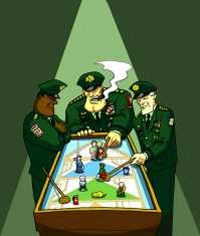
Property managers have a lot on their minds. There are board meetings to attend, legal issues to wade through, phone calls to return, emails to answer and a constant parade of maintenance issues to contend with at any given time. The job is tough -- especially if the person with the job is interested in going above and beyond the call of duty. What are the qualities of a good property manager? And what makes a good manager great?
Fred Prassas is currently serving as president of the Chicago-based Institute of Real Estate Management (IREM), a nationally-certified organization for real estate management professionals. Prassas says that fundamentally, a good manager has a strong grasp of leadership and organization -- after that, the other pieces fall more easily into place.
Leadership & Organization
“Managers have to have a strong sense of leadership because they’re working with such tremendous diversity,” Prassas says. “There are boards, staff members and vendors who are all looking to you - a good manager can direct the process.” Prassas says that while “the board is the boss,” a competent manager is always able to make decisions that are in keeping with the wishes of the residents. In addition, leadership qualities usually rub off on the other employees in the company. “The ability to create a team and teamwork-oriented environment is very important,” Prassas adds.
But leadership wouldn’t be of much use unless it was executed with organization in mind. “When you’re dealing with things like project management, accountability and staff management, the person in charge needs to be one who can handle it all in an orderly way,” says Prassas.
Gary Wilkin is founder of Wilkin Management Group in Mahwah, New Jersey and has served as the company president for more than 25 years. Wilkin agrees that a good sense of leadership is the main ingredient in a good manager.
“The most important thing a manager can do with his or her knowledge is in the application of it -- that’s where leadership comes in,” says Wilkin. “Strong leadership allows a manager to direct issues and therefore improves their clients’ ability to make decisions, too. The manager is the one who takes the lead.”
Alex Kuffel has served as the executive vice president of Pride Property Management in New York for the past 11 years and says, “Knowledge, construction, and financials can be taught, but a sense of organization and follow through is inherent.” Kuffel says that the most important trait in a third party manager is a sense of follow through.
Times Have Changed
The tools of the property management trade have certainly changed over time. What once was a job that involved a file cabinet, pager and fax machine now calls for a Blackberry, a PC and (at least) one cell phone. As technology has advanced, so has the speed of communication and clients are certainly used to it.
“You don’t have to go too far back in time to see how much has changed in this industry,” says Wilkin. “You used to hear your beeper go off and have to go find a phone to take care of a situation. Now, even email is with you at all times -- managers are always available.” Wilkins says that while the constant contact is largely a good thing, it’s got its downside, too. “Today’s manager can do more, but there’s a lot more pressure,” he says. “Managers are more directly engaged with a client or homeowner and therefore touch and feel most issues immediately.” Prassas agrees that technology has made a huge difference in modern property management but also sees how the advances can add stress to any manager’s job. “Technology has allowed everything to get done faster and more affordably,” says Prassas. “People are used to having instant access to information, though, so a lot of times owners and boards aren’t satisfied with getting information once a month. Managers have to make information available on a constant basis -- people are scrutinizing and analyzing info all the time.” The Internet has aided the property manager in many ways, allowing codes, byaws and announcements to be updated on a daily basis on websites, giving those who want the up-to-the-minute news on their co-op or condo board the ability to have it.
Edward Frank is president of Arthur Edwards, Inc., a property management firm in River Vale, New Jersey, and says that a good manager uses technology to his or her advantage. “I want people to have information and open communication,” he says. “Those are the two main successful ingredients for any successful property.” In order to do this, Frank hosts an interactive website for all his clients. “We give owners with passwords access to information, so at their leisure, they can get the information they want.”
“I like to think technology has made us all better at what we do; more productive,” says Wilkin. “Some people think it’s all gobbledy-gook, but I think it’s made my company able to do a lot more.”
Kuffel agrees. “It’s fantastic. Today’s clients are immediately informed. For example, we just did roof inspections. We sent pictures, the analysis and our recommendation to the board within hours.”
In addition to the technological advances that have changed the manager’s job over even the past 10 years, the actual landscape has changed, too. “The buildings themselves are more complex,” says Wilkin. “And codes these days are more stringent than they used to be. A good manager needs to possess analytical skills to handle all that.”
Jeff Heidings is president of New York’s Siren Management Corp. and adds that when you get right down to it, economics drives the major changes in his industry. “The industry is greatly affected by the economy,” says Heidings. “Property is a more material investment than ever and therefore there are more industry organizations and trade journals -- boards are more informed than ever. And when the costs of fuel, insurance and real estate go up, up, up, managers must be more diligent to keep all controllable costs in line in order to meet budgets and save clients money.” Heidings says that a good property manager simply has to stay just as informed as everyone else in order to handle the changes in the industry. “Twenty years ago, there were more choices fro insurance than there are now, making it necessary to bargain better within the more limited market. You have to be a continuous shopper in order to keep your bottom line consistent. You have to keep up.”
Trouble in Paradise
Tasks might be easier with the help of the all powerful computer chip, but all the gadgets in the world can’t erase all conflict or streamline operations into perfection. In fact, much of the manager’s job is just that: dealing with problems as they arise.
“You can gauge satisfaction by the clients themselves. If they aren’t happy, the manager isn’t doing their job,” says Kuffel. And everyone knows, when clients aren’t happy, that means trouble, especially when there are conflicts that heat up between neighbors. “We try to do everything we can before litigation. We establish a long paper trail from the start to show we’ve exhausted all possibilities and then move to ADR.”
“The way you can circumvent all problems is with solid communication,” says Prassas. “As far as common problems that arise within the client-manager relationship, it’s hard to say. It all depends on the property. Each one brings with it particular challenges -- there really aren’t many common threads.” Prassas does add, however, that most dysfunctional relationships happen when there is a lack of respect and trust on either side of the partnership.
“No management company should ever lose a client,” says Frank. “With proper communication, it shouldn’t matter what changes in the board or owner situation.” And proper communication happens only when a sturdy foundation of understanding has been established from the start.
“Conflicts happen when people don’t know what their roles are,” says Wilkin. He and Frank agree that, sometimes, what’s expected from either party is unclear. “Simply put, boards expect a manager to execute or oversee a plan they’ve established. A manager should be a liaison between the board and the actual property, to take initiative with legal issues and certainly to respond to emergency situations.” Wilkin says that sometimes the lack of understanding about roles comes when a board is newly formed. “We give input to new or inexperienced boards,” he says. “We create structure, methodologies on bidding, timing and help them understand the financials, so when there is a board meeting, it’s not chaos.” Prassas adds that new boards (and old ones) need not just guidance, but patience.
“Say you’ve got a property that was self-managed for years,” he says. “The board brings in a manager and, a lot of the time, they expect utopia right away, but those things take time. Everyone has to understand that the main role of the manager in most cases is to let the board make the more strategic decisions and deal with the property in the long term and let the manager handle the day to day operations.”
No matter what trouble arises, a good manager, says Prassas, “has to deal with [conflict] in an honest, intelligent and forthright manner.”
What It Takes
The Carnegie Method is a popular gauge in the sales industry to determine whether or not a person is cut out for a sales career. While there isn’t a specific test to profile a good property manager, Prassas says that tests like Meyers-Briggs can be helpful. “That test, when administered properly, can be good for judging a person’s ability to work in teams. Personality testing can sometimes help predict success or failure -- it is valuable.” Prassas says that a lot of companies do use such tests to determine whether or not a candidate has particular qualities, so if you’re thinking of a career in property management, get your No. 2 pencil ready.
Kuffel says that when his company brings in new managers, they have the new hire follow a senior property manager around to get “hands on” training. “We watch them to see how they perform during a probationary period,” says Kuffel. During this time, Kuffel says he can tell a good manager from one that may not be cut out for the job.
And no matter how well (or how poorly) you do on a personality test, a good manager must remember that actions speak louder than words -- and that learning from mistakes is crucial. “Sharing the experiences we’ve had over the years -- successes and failures is critical,” says Frank. “We embrace it all and share that experience with clients.”
“One of the reasons I like this business so much is because it’s not the same thing every day,” says Prassas with a chuckle. “It’s never the same thing twice.” The ability of a manager to be flexible, therefore, is of utmost importance. But as the environment around a manager heats up, gets tense or changes (again) a good manager will respond to that environment with honesty and integrity.
“We have a kind of unwritten philosophy around here,” says Wilkin. “I tell my managers not to take ‘positions.’ It’s our watchword. When a manager is dealing with a difficult person, I urge them not to “take a position,” not to react from an emotional place -- you have to maintain your composure, you have to act with honesty and integrity. You can be the best at something, but if you are dishonest, you will fall.”
“Property management is business. In my opinion, someone with good general business skills is going to be a good property manager,” says Heidings. “There are expenses, loans, taxes, operation costs. Customers bring in revenue. You have to provide high quality service—when the customers get high quality service, they pay their fees in a timely and orderly fashion and that’s important.”
Kuffel says that attention to detail is essential in business and property management is no exception. “Everything that can be negotiated should be. Nine out of ten managers that sign off on checks and expenses do it in an assembly line fashion. But we look at everything and ask, “Did we get what we paid for?” We train our managers to look closely at everything to make sure we’re getting accurate times and bills for contractors, accurate prices for goods.”
With the right blend of organization, leadership and solid communication, a good property manager can do more than run a successful community—they can change the face of it.
“Obviously, managers can make a difference in the community,” says Prassas. “This is partly in terms of stability over time. Boards and staff change, but a good management company puts the odds in the community’s favor for long term success.”
Mary Fons is a freelance writer and a frequent contributor to The Cooperator.






8 Comments
Leave a Comment